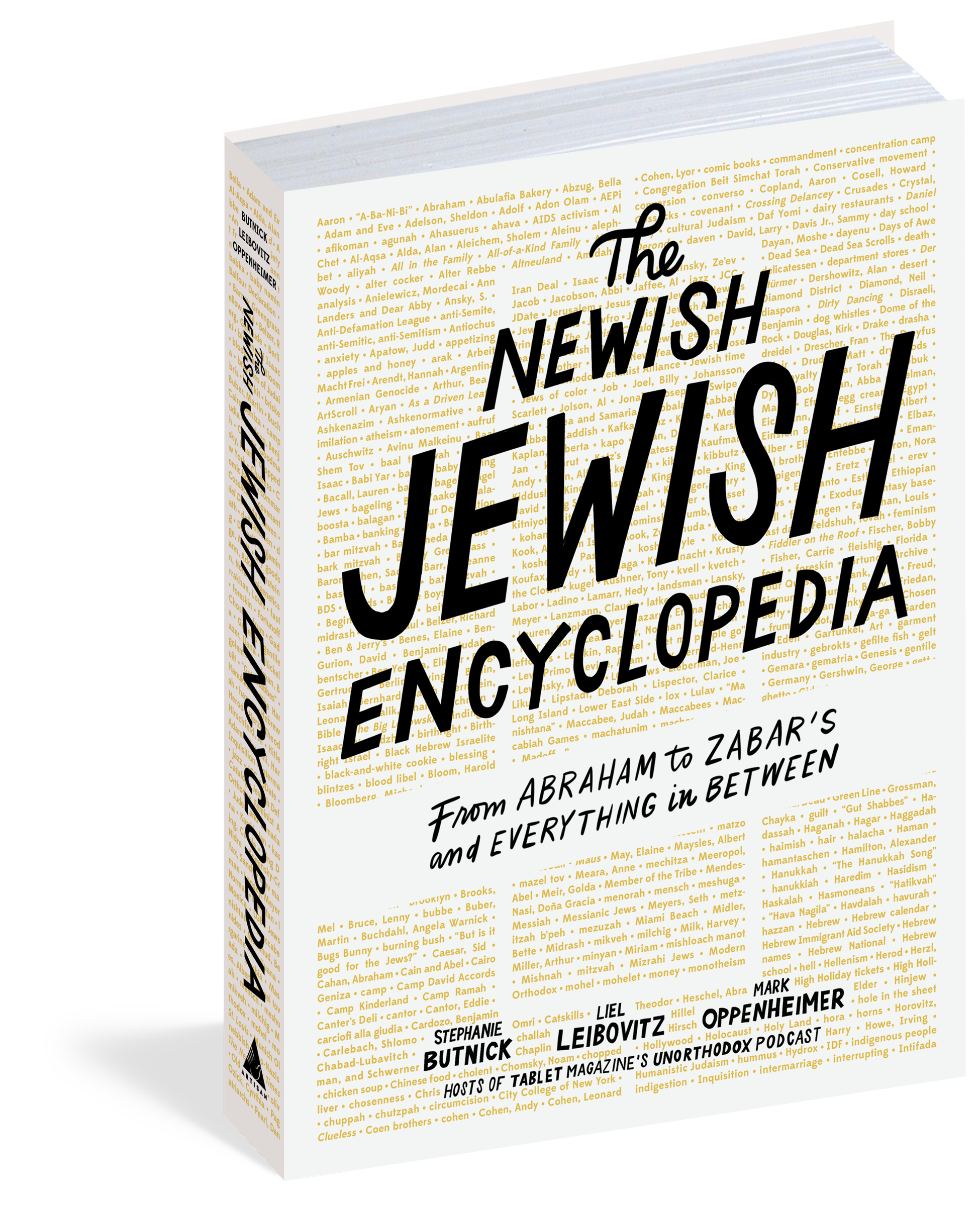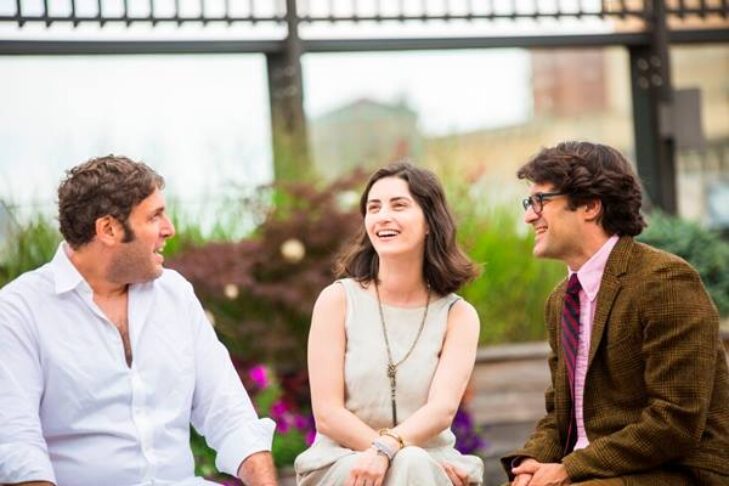Liel Leibovitz, a senior writer for Tablet Magazine, is one of the three editors of “The Newish Jewish Encyclopedia: From Abraham to Zabar’s and Everything in Between.” Produced in conjunction with the magazine’s popular “Unorthodox Podcast,” Leibovitz, along with Stephanie Butnick, another encyclopedia editor and Tablet’s deputy editor, will be at Temple Israel of Boston celebrating the third annual Arts Matter Shabbat on Friday, Oct. 25.
Leibovitz recently told JewishBoston that, like the podcast, the encyclopedia “started on a lark.” Butnick and her new husband hatched the idea on their honeymoon. “We—me, Stephanie and a third editor, Mark Oppenheimer—understood just how momentous this project was,” said Leibovitz. “Any attempt to summarize or reduce thousands of years of Jewish history into a 200-page volume is insanity!”
One of the first challenges for the editors, who also host the Unorthodox Podcast, was to decide on criteria for selecting entries. The first thing they did was to set general guidelines that would shape their book “as one that would feel very much of the moment yet have a certain timeliness.” Leibovitz further pointed out that no comprehensive project like compiling the encyclopedia has been attempted since the publication over 40 years ago of “The First Jewish Catalog: A Do-It-Yourself Kit.”
How does your encyclopedia capture different facets of American Judaism?
On the podcast episode we did about the book, we described a four-page, double-spread entry on the history and beliefs of American Judaism’s denominations. It wasn’t in an exhausted form, but it was informative, edifying and entertaining. One of the greatest moments in the process of working on this book was when we finished putting together that particular section and we picked up the phone to call a leader in each of these denominations. We read the entry out loud to them to get their blessing. This led to incredibly fascinating conversations. People not only appreciated having an opportunity to see how they were regarded from the outside, but also appreciated the chance to edify and educate us. It gave us one more layer to capture these voices in a way that rang true to the people involved and the organizations themselves.
Another essential element that was very important for us was to break free from the trap of Ashkenormativity. We didn’t want the book to reflect solely the Ashkenazi-centric traditions that have dominated Jewish life for so long. We wanted sections on all kinds of food enjoyed by Moroccan and Tunisian Jews—sections on practices and personalities that reflected Egyptian, Syrian and Persian Jews.
We reached out to these communities. Consequently, our extensive list of contributors to the book represents Jews of color and different gender and sexual orientations. It’s a list that truly captures the rich mosaic of Jewish life.
The other thing that was very clear to us was that we were inevitably going to mess up royally. At our first writing session, we joked, “Just watch us publish this book and get an angry letter about who we forgot or didn’t spend more time on.” But we relish that thought. We can’t wait to get these angry letters from readers! One of the values of this project is to understand as a writer and reader that it’s an invitation to a disputation. Look at the Talmud, the documentation of the wise ancient rabbis arguing fiercely with each other without any conclusion. This robust arguing is precisely how Jews process life.

What were among the most challenging entries to write?
When we wrote the Zionism entry—the three of us are committed Zionists—we went through six or seven drafts of the entry. It became apparent to us early on that there are not insignificant portions of the contemporary Jewish community for which Zionism is far from a foregone conclusion. We didn’t want these readers to flip through this entry and say this is only a book for people who believe a certain way. We wanted to honor the panoply of voices and points of view. It can be incredibly difficult to put yourself in the shoes of someone who believes in the polar opposite of what you believe. If something in the process presented a real overwhelming challenge, it was that.
Why is there an entry for Louis Farrakhan in the book?
[The Farrakhan entry] reflects our desire to write a timely book. We felt in the year 2018-2019, when we were working on this book, he had arisen. We see some of the leaders of the Women’s March, unfortunately, praise him and continue to identify with him. He is one of the most out and vocal anti-Semites in America, and we thought it was important to recognize and acknowledge that. And the threat [of anti-Semitism] we want to think of as historical and ephemeral is very real and very present in our midst.
What were your criteria in selecting entries?
Our criteria were fluid. We wanted to respect the diversity of the American Jewish community and stay away from things that felt biased toward any one ethnicity, sexual orientation or political leaning.
We are sadly in the midst of one of the most troubling times in American Jewish history. If all we do in response to anti-Semitism is to practice anti-anti-Semitism and stand guard and devote ourselves to the hate people feel against us, we’ve lost. I think the correct response is to lead a fuller, more fulfilling Jewish life. For some people that may mean attending synagogue. Others might do it by picking up a copy of the Talmud or “My Name is Asher Lev.” It doesn’t matter how you engage. What matters is that you choose to engage with something that gives you an overwhelming, super overabundant way to reclaim, rediscover and rejoice in your Judaism.
What do you hope people will take away from the encyclopedia?
We hope we have created a book that provides a thousand different entry points for people to engage deeply with their Judaism in whatever way they feel comfortable. That can mean digging deeper into cultural aspects, learning about theology, engaging with history, caring about politics. Whatever you are looking for to have a slightly more meaningful life, the encyclopedia is a portal for this.
This interview has been edited and condensed.



